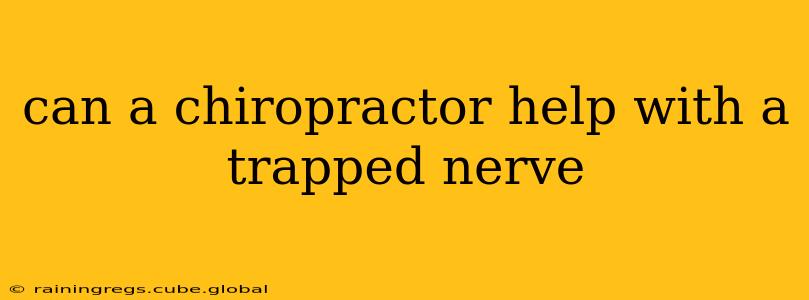Can a Chiropractor Help with a Trapped Nerve?
Yes, a chiropractor can often help with a trapped nerve, also known as a pinched nerve. Chiropractic care focuses on the musculoskeletal system and the nervous system's relationship to it. A trapped nerve occurs when pressure is placed on a nerve, causing pain, numbness, tingling, or weakness. Chiropractors use various techniques to alleviate this pressure and promote healing. However, it's crucial to understand the limitations of chiropractic care and when to seek other medical advice.
What Causes a Trapped Nerve?
Before diving into how a chiropractor can help, let's understand what causes a trapped nerve. This pressure can stem from several sources:
- Bone spurs: Overgrowths of bone can press on nearby nerves.
- Herniated discs: A bulging or ruptured intervertebral disc can impinge on a spinal nerve.
- Muscle spasms: Tight or spasming muscles can compress nerves.
- Inflammation: Swelling from injury or other conditions can irritate and press on nerves.
- Ligament injuries: Damage to ligaments can cause instability, leading to nerve compression.
- Poor posture: Prolonged poor posture can put undue strain on the spine and nerves.
- Repetitive movements: Repeated actions can cause muscle fatigue and nerve irritation.
Understanding the root cause is vital in determining the most effective treatment approach.
How Can a Chiropractor Help with a Trapped Nerve?
Chiropractors utilize a variety of methods to address trapped nerves, primarily focusing on restoring proper spinal alignment and reducing nerve irritation. Common techniques include:
- Spinal manipulation: Gentle adjustments to the spine aim to restore proper joint mobility and reduce pressure on the affected nerve. This is often the cornerstone of chiropractic treatment for trapped nerves.
- Soft tissue mobilization: Techniques like massage or myofascial release address muscle tension and spasms that can contribute to nerve compression.
- Stretching and exercises: Specific exercises are recommended to improve flexibility, strengthen supporting muscles, and improve posture, all vital in preventing future nerve impingement.
- Lifestyle advice: Chiropractors often provide guidance on ergonomics, posture, and activities that may be exacerbating the condition. This preventative approach is crucial for long-term relief.
What are the Limitations of Chiropractic Care for Trapped Nerves?
While chiropractic care is often effective, it's not a cure-all for every case of a trapped nerve. Some limitations include:
- Severe cases: In severe cases, such as those caused by significant disc herniation or significant bone spurs, surgery might be necessary.
- Underlying conditions: If a trapped nerve stems from an underlying medical condition, such as diabetes or a systemic illness, addressing the underlying issue is crucial. Chiropractic care may help manage symptoms but won't address the root cause.
- Lack of improvement: If symptoms don't improve after a reasonable period of chiropractic care, it's essential to consult a medical doctor to explore other treatment options.
When Should I See a Medical Doctor Instead of a Chiropractor?
You should seek medical attention from a doctor if:
- You experience sudden, severe pain, especially with weakness or numbness.
- You have bowel or bladder dysfunction.
- Your symptoms worsen rapidly.
- You suspect the trapped nerve may be caused by a serious underlying medical condition.
- You have severe back pain that doesn't improve after a couple of weeks of conservative treatment.
Can a Chiropractor Diagnose a Trapped Nerve?
While chiropractors can assess your symptoms and musculoskeletal system to identify potential causes of your pain, they are not medical doctors and cannot officially diagnose a trapped nerve. A medical doctor, through imaging studies (like MRI or CT scans) and a neurological examination, can provide a definitive diagnosis. However, a chiropractor's assessment can be a valuable part of a comprehensive approach to care, providing information for your doctor to use in their diagnosis.
What other treatments are available for a trapped nerve?
Apart from chiropractic care, other treatments for trapped nerves include:
- Physical therapy: Similar to chiropractic care, but with a greater focus on exercises and strengthening.
- Medication: Over-the-counter pain relievers (NSAIDs) or prescription medications may help manage pain and inflammation.
- Injections: Corticosteroid injections can reduce inflammation around the nerve.
- Surgery: In severe cases, surgery may be required to decompress the nerve.
In conclusion, chiropractic care can be a valuable part of managing a trapped nerve, but it's essential to understand its limitations and seek appropriate medical attention when necessary. A collaborative approach, involving both a chiropractor and a medical doctor, often provides the best outcome. Remember to always consult with healthcare professionals for a proper diagnosis and personalized treatment plan.
